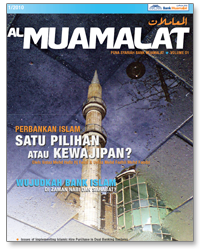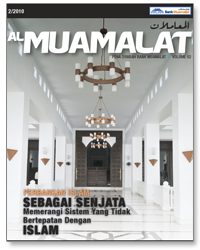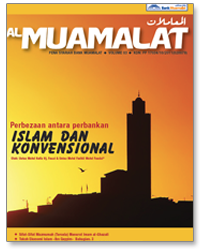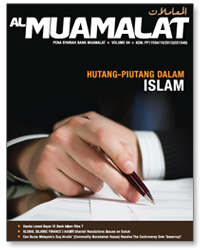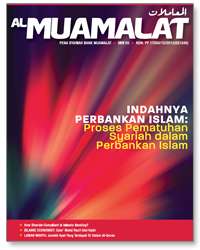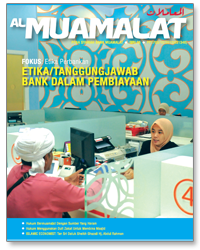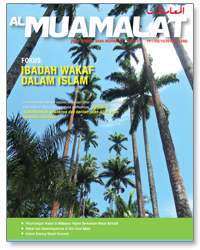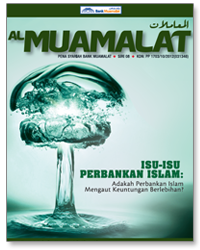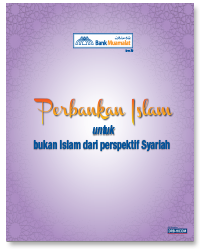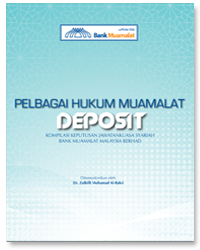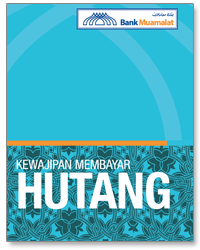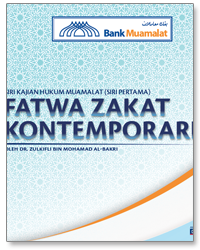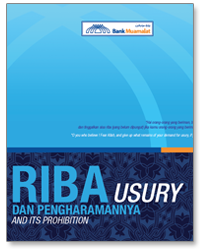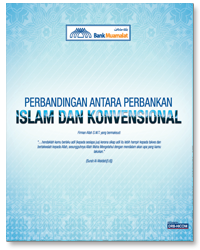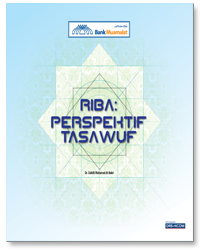Islamic Financial Services Act 2013
- The regulatory and supervisory framework of Malaysia enters a new stage of its development as the Financial Services Act (FSA) and Islamic Financial Services Act 2013 (IFSA) come into force on 30 June 2013.
- The IFSA is the culmination of efforts to modernize the laws that govern the conduct and supervision of Islamic financial institutions in Malaysia to ensure that this law continues to be relevant and effective to maintain financial stability, support inclusive growth in the financial system and the economy, as well as to provide adequate protection for consumers.
- The laws also provide Bank Negara Malaysia with the necessary regulatory and supervisory oversight powers to fulfill its broad mandate within a more complex and interconnected environment, given the regional and international nature of financial developments.
- This includes an increased focus on preemptive measures to address issues of concern within financial institutions that may affect the interests of depositors and policyholders, and the effective and efficient functioning of financial intermediation.
- It is important that Malaysia’s regulatory and supervisory system is adequately equipped to respond effectively to new and emerging risks so that confidence in the financial system is preserved and that the critical financial intermediation activities which are vital to the economy are not disrupted.
- The FSA and IFSA amalgamate several separate laws to govern the financial sector under a single legislative framework for the conventional and Islamic financial sectors respectively, namely, the Banking and Financial Institutions Act 1989 (BAFIA), Islamic Banking Act 1983, Insurance Act 1996 (IA), Takaful Act 1984, Payment Systems Act 2003 and Exchange Control Act 1953 which are repealed on the same date.
Key features of the new legislation
- Greater clarity and transparency in the implementation and administration of the law. This includes clearly defined regulatory objectives and accountability of Bank Negara Malaysia in pursuing its principal object to safeguard financial stability, transparent triggers for the exercise of Bank Negara Malaysia’s powers and functions under the law, and transparent assessment criteria for authorizing institutions to carry on regulated financial business, and for shareholder suitability;
- A clear focus on Shariah compliance and governance in the Islamic financial sector. In particular, the IFSA provides a comprehensive legal framework that is fully consistent with Shariah in all aspects of regulation and supervision, from licensing to the winding-up of an institution;
- Provisions for differentiated regulatory requirements that reflect the nature of financial intermediation activities and their risks to the overall financial system;
- Provisions to regulate financial holding companies and non-regulated entities to take account of systemic risks that can emerge from the interaction between regulated and unregulated institutions, activities and markets. The Minister of Finance may subject an institution that engages in financial intermediation activities to ongoing regulation and supervision by Bank Negara Malaysia if it poses or is likely to pose a risk to overall financial stability;
- Strengthened business conduct and consumer protection requirements to promote consumer confidence in the use of financial services and products;
- Strengthened provisions for effective and early enforcement and supervisory intervention
Shariah Requirements outlined under IFSA 2013
Clause 28:
- An institution shall at all times ensure that its aims and operations, business, affairs and activities are in compliance with Shariah.
- For the purposes of this Act, a compliance with any ruling of the Shariah Advisory Council in respect of any particular aim and operation, business, affair or activity shall be deemed to be a compliance with Shariah in respect of that aims and operations, business, affair or activity.
- Where an institution becomes aware that it is carrying on any of its business, affair or activity in a manner which is not in compliance with Shariah or the advice of its Shariah committee or the advice or ruling of the Shariah Advisory Council, the institution shall-
- immediately notify the Bank and its Shariah committee of the fact;
- immediately cease from carrying on such business, affair or activity and from taking on any other similar business, affair or activity; and
- within thirty days of becoming aware of such noncompliance or such further period as may be specified by the Bank, submit to the Bank a plan on the rectification of the non-compliance.
- The Bank may carry out an assessment as it thinks necessary to determine whether the institution has rectified the non-compliance referred to in subsection (3).
- Any person who contravenes subsection (1) or (3) commits an offence and shall, on conviction, be liable to imprisonment for a term not exceeding eight years or to a fine not exceeding twenty-five million ringgit or to both.
Clause 29:
- The Bank may, in accordance with the advice or ruling of the Shariah Advisory Council, specify standards-
- on Shariah matters in respect of the carrying on of business, affair or activity by an institution which requires the ascertainment of Islamic law by the Shariah Advisory Council; and
- to give effect to the advice or rulings of the Shariah Advisory Council.
- In addition, the Bank may also specify standards relating to any of the following matters which does not require the ascertainment of Islamic law:
- Shariah governance including-
- functions and duties of the board of directors, senior officers and members of the Shariah committee of an institution in relation to compliance with Shariah;
- fit and proper requirements or disqualifications of a member of a Shariah committee; and
- internal Shariah compliance functions; and
- (b) any other matter in relation to the business, affair and activity of an institution for the purposes of compliance with Shariah.
- Shariah governance including-
- Every institution, its director, chief executive officer, senior officer or member of a Shariah committee shall at all times comply with the standards specified by the Bank under subsections (1) and (2) which are applicable to such person.
- Every institution shall at all times-
- ensure that its internal policies and procedures on Shariah governance are consistent with the standards specified by the Bank under this section; and
- whether or not standards have been specified by the Bank under this section, manage its business, affairs and activities in a manner which is not contrary to Shariah.
- Every director, officer or a member of a Shariah committee of an institution shall at all times comply with the internal policies and procedures adopted by such institution to implement the standards specified by the Bank under subsection (1) or (2).
- Any person who fails to comply with any standards specified under subsection (1), commits an offence and shall, on conviction, be liable to imprisonment for a term not exceeding eight years or to a fine not exceeding twenty-five million ringgit or to both.
Clause 30:
- A licensed person shall establish a Shariah committee for purposes of advising the licensed person in ensuring its business, affairs and activities comply with Shariah.
- For the purposes of subsection (1), where there is more than one licensed person within a financial group, one of the licensed persons may apply to the Bank for the establishment of a single Shariah committee within the financial group and the Bank may approve the application in writing if the Bank is satisfied that the Shariah committee so established is capable of ensuring compliance with Shariah by all licensed persons within the financial group.
- The Bank may require an approved person or operator of a designated payment system to establish a Shariah committee for purposes of advising the approved person or operator of a designated payment system in ensuring their business, affairs and activities comply with Shariah.
Clause 31:
No person shall be appointed, reappointed or accept any appointment as a member of a Shariah committee unless such person meets the requirements as set out in any standards as may be specified by the Bank under subparagraph 29(2)(a)(ii) and has obtained the prior written approval of the Bank.
Clause 32:
A Shariah committee and every member of the Shariah committee shall have such duties and functions set out in any standards as may be specified by the Bank under subparagraph 29 (2) (a)(i).
Clause 33:
- A member of a Shariah committee shall cease to be a member if-
- such member resigns as a member;
- the institution, subject to the Bank’s prior written approval under subsection (2), terminates the appointment of such member;
- such member is disqualified pursuant to any standards specified by the Bank under subparagraph 29(2)(a)(ii); or
- such member no longer meets the fit and proper requirements as may be specified by the Bank under subparagraph 29(2)(a)(ii) to the satisfaction of the Bank.
- A member of a Shariah committee who-
- resigns as a member; or
- becomes aware that he is disqualified pursuant to any standards specified by the Bank under subparagraph 29(2)(a) (ii) and as such, pursuant to paragraph (1)(c), cease to be a member, shall notify the Bank of that fact and the reasons thereof immediately or in any case not later than fourteen days of such circumstance.
- An institution shall not terminate the appointment of a member of its Shariah committee unless the institution has obtained the prior written approval of the Bank to do so.
- Subject to section 273, the Bank may, by an order in writing, remove a member of a Shariah committee if the Bank is of the opinion that-
- any of the circumstances set out in paragraph (1)(c) or (d) has occurred in relation to that member and such member remains to be a member of the Shariah committee; or
- such member has contravened any provision of this Act or failed to comply with any standards applicable to him.
- The removal of a member of a Shariah committee under subsection (4) shall be lawful and valid notwithstanding anything contained in a contract of service or any other agreement relating to his appointment and whether or not made or provided for under any written law, and a person so removed from office shall not be entitled to claim compensation for the loss of office.
Clause 34:
- Where a person ceases to be a member of a Shariah committee of an institution pursuant to-
- paragraph 33(1)(a), (b) or (d); or
- paragraph 33(1)(c) if such disqualification is within the institution’s knowledge, the institution shall notify the Bank in writing of that fact and the reasons of such cessation immediately or in any case not later than fourteen days from the date of such cessation.
- Where a person ceases to be a member of a Shariah committee under subsection 33(1) or is removed by the Bank under subsection 33(4), the institution shall appoint a new member of its Shariah committee in accordance with section 31 within such period as may be specified by the Bank.
Clause 35:
- An institution and any director, officer or controller of such institution shall-
- provide any document or information within its or his knowledge, or capable of being obtained by it or him, which the Shariah committee may require; and
- ensure that such document or information provided under paragraph (a) is accurate, complete, not false or misleading in any material particular, to enable the Shariah committee to carry out its duties or perform its functions under this Act.
- Except as provided in section 36, a member of a Shariah committee shall not disclose any document or information furnished under subsection (1) to any other person.
Clause 36:
A member of a Shariah committee shall not be liable-
- for a breach of a duty of confidentiality between such member and the institution in respect of-
- any reporting to the Bank; or
- the discharge of his duties and performance of his functions, pursuant to any standards specified by the Bank under subparagraph 29(2)(a)(i) which was done or made in good faith; or
- to be sued in any court for defamation in respect of any statement made by the member without malice in the discharge of his duties under this Act.
Clause 37:
- The Bank may require an institution to appoint any person as the Bank may approve, to carry out an audit on Shariah compliance by the institution.
- The person appointed under subsection (1) shall have such duties and functions as may be specified by the Bank and shall submit a report to the Bank on the audit carried out pursuant to this section.
- The remuneration and expenses of the person appointed under subsection (1) relating to any audit on Shariah compliance under this section shall be borne by the institution.
- A person appointed under subsection (1) shall not be liable for a breach of duty of confidentiality between such person and the institution in respect of matters reported to the Bank pursuant to an audit on Shariah compliance under this section.
Clause 38:
- Without prejudice to section 37, the Bank may appoint for an institution any person to conduct an audit on Shariah compliance-
- if the institution fails to appoint a person under subsection 37(1);
- in addition to the person appointed under subsection 37(1); or
- under any other circumstances as the Bank deems appropriate for the purposes of compliance with Shariah by the institution, and the remuneration and expenses relating to such appointment shall be borne by the institution.
- The person appointed under subsection (1) shall have such duties and functions as may be specified by the Bank and shall submit a report to the Bank on the audit carried out pursuant to this section.
- A person appointed under subsection (1) shall not be liable for a breach of duty of confidentiality between such person and the institution in respect of matters reported to the Bank pursuant to an audit on Shariah compliance under this section.
“Please be informed that we have discontinued the publication of the Al-Muamalat magazine and replaced with new publication of monthly article (“Publication”).The information, opinions and analyses contained in the Publication have been prepared in good faith by Bank Muamalat Malaysia Berhad (“BMMB”) and are supplied for general information only. All information, analyses and opinions contained in the Publication are not to be relied upon, include but not limited to as the authoritative or taken in substitution for the exercise of independent verification and judgment by any recipient, and are subject to change without notice. The Publication is not, and shall not be construed as, an offer document or an offer or solicitation to buy or sell any product or to enter into any transaction or to take or refrain from taking any action in respect of the same. You are encouraged to consult your professional advisor(s) if you have any specific issue(s) and/or question(s) relating to the Publication. BMMB shall not be liable in any manner whatsoever for any direct and/or consequential loss arising from any use of or reliance on any of the contents of the Publication. The Publication shall not be reproduced or disclosed (in whole or in part) to any other person without the prior consent of BMMB”.
Al Muamalat
Handbook
| No | Conventional Terms | Islamic Terms |
| 1 | Interest (Riba/ ربا ) | Profit – Sale based contract (Al-Ribh/ الربح ) Dividend – CASA/IA account (Mudharabah) (Al-Hissah/ الحصة ) Hibah – CASA (Wadi’ah) (Al-Hibah/ الهبة ) |
| 2 | Loan/Borrowing (Qardh/ قرض ) Islamic Loan without interest is acceptable. | Financing (Al-Tamweel/ التمويل ) |
| 3 | Repayment (Sadad al-Dayn/ ر دُ اُلدين / سداد اُلدين ) | Payment (Daf’un / دفع ) |
| 4 | Borrower (Muqtaridh/ مقترض ) | Customer (Al-Zaba’in/ الزبائن ) |
| 5 | Lender (Muqridh/ مقرض ) | Financier (Al-Mumawwil/ الممول ) |
| 6 | Insurance (Ta’min/ تأمين ) | Takaful (Al-Takaful/ التكافل ) |
| 7 | Penalty (Gharamah/ غرامة ) | Compensation (Ta’widh/ تعويض ) |
| 8 | Fixed Deposit Account (Wadi’ah marbutah/ وديعة مُربوطة ) | General Investment Account (Hisab al-Istithmariah al-‘Ammah/ حساب اُلاستثمارية العامة ) Fixed Term Account-i (Hisab Muddah Muhaddadah/ حساب مُدة مُحددة ) |
| 9 | Overdraft (Al-Sahb ‘ala al-Makshuf/ السحب عُلى اُلمكشوف ) | Cash Line (Khat al-Naqdiah/ خط اُلنقدية ) |
| 10 | Non-performing Loan (NPL) (Al-Qurudh ghayr al-‘Amilah/ القروض غُير العاملة ) |
Non-performing Financing (NPF) (Al-Tamweel ghayr al-‘Amil/ التمويل غُير اُلعامل ) |
| 11 | Early Settlement Penalty (Gharamah al-Saddad al-Mubakkir/ غرامةُ ( السداد اُلمبكر |
Reduction of Ibra’ (Ibra’/ ابرأ ) |
| 12 | Bond (Sanadaat/ )سندات | Sukuk ( )صكوك |



